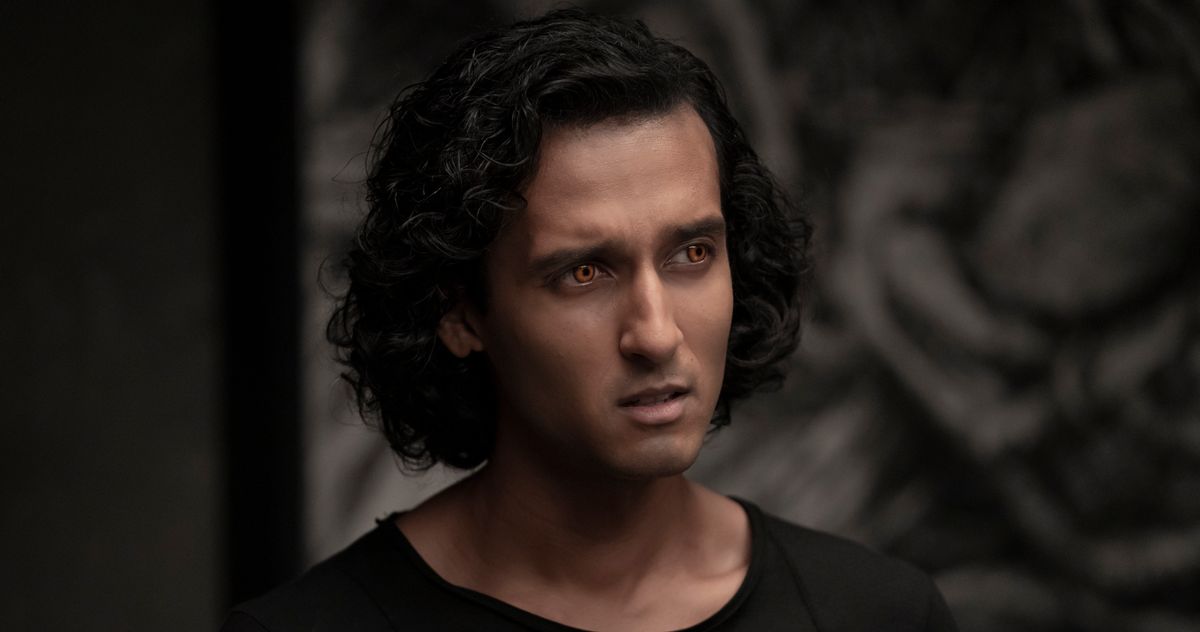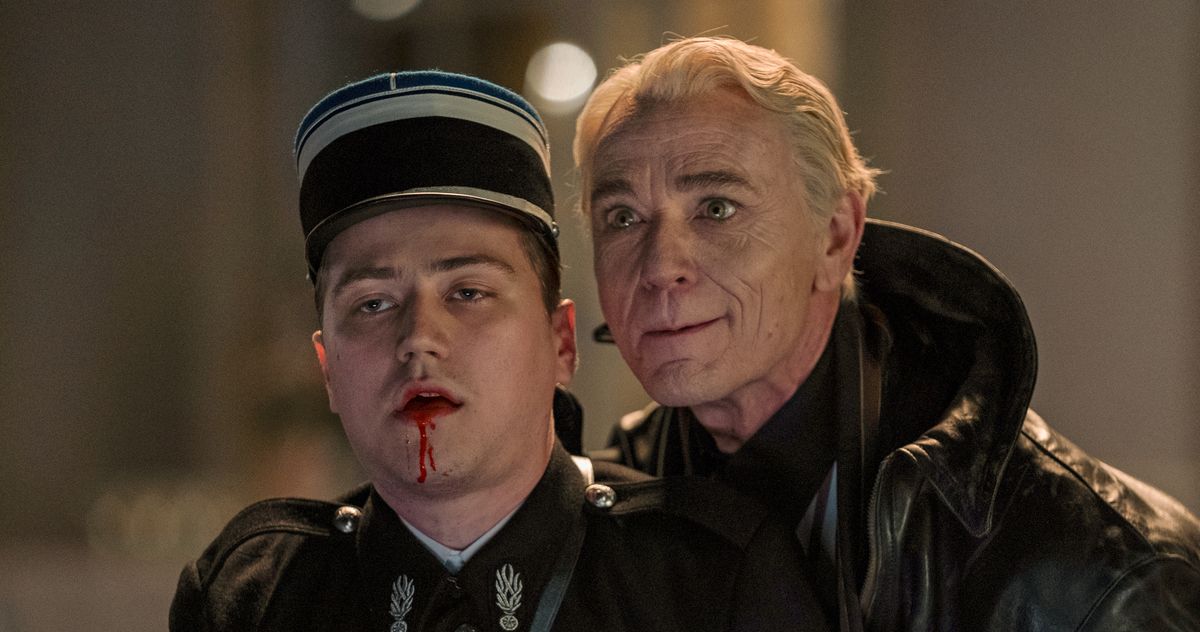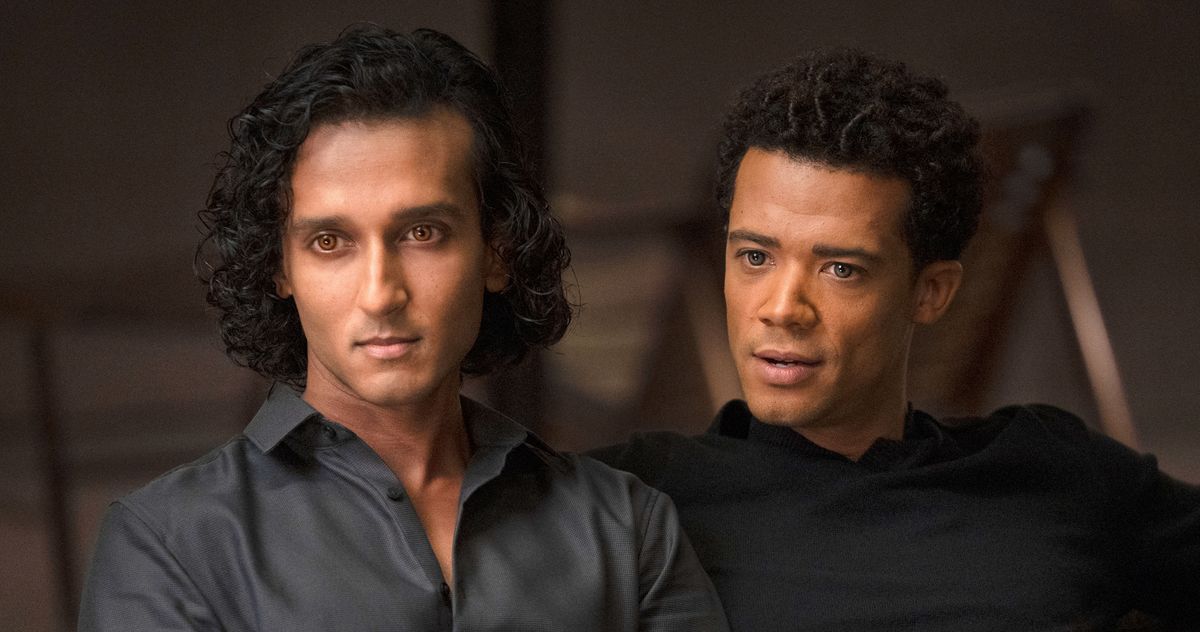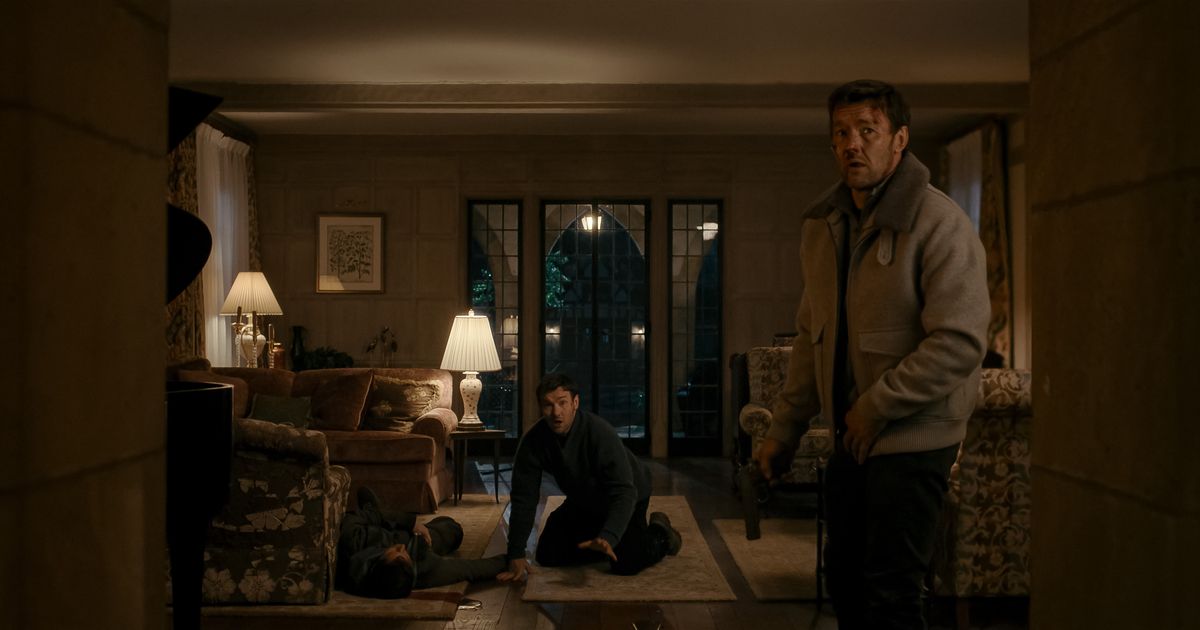Photo: Larry Horricks/AMC
Almost all of the show has been building to this. We’ve known for a while now that we were going to lose Claudia. We knew shit would go down in Paris. Still, I thought we had more time with her. I thought she’d get to be happy for a little while longer with Madeleine and grow as a person away from Louis and the coven. For goodness’ sake, she was only 46! That’s tragically young by human standards and essentially infanticide in vampire years! One of the most fascinating elements of this whole universe has been snuffed out. But oh, what a way to go!
I definitely need to read the books, I think, to understand what made Santiago like this. There are allusions to his backstory and Easter eggs peppered throughout the season: A newspaper clipping mentioning another actor in the 1920s, that lingering extra millisecond he takes when showing Claudia the box where his maker’s remains lie in the wet room. Clearly, Santiago had a great love (besides the stage) who turned him, or who was turned along with him, and was put to death by Maitre for the transgression. Or else, his lover was human, and could not be turned, and was killed by the others. Can book readers not spoil it for me but at least tell me if I’m warm? Or is he just a dick? I promise I’ll catch up on the Chronicles when the season’s over. But it’s always annoying to see someone who styles themself as a punk actually just act super authoritarian and Fashy. He was no Spike, after all. He was a Joanne.
We pick up around last week’s cliffhanger, with Louis, Claudia, and Madeleine getting bagged and tagged by what looks like the non-equity Beetlejuice ensemble, aka the Paris coven/troupe formerly belonging to Armand. Louis’s recollections of their kidnapping are frazzled and shaken up by trauma. He cries out for Claudia as they’re dragged down into the coven-hovel below the stage and recounts that he “heard when the rats found her.” Cut to world-renowned playwright Samuel Barclay Beckett cackling maniacally. This is not what we mean when we say we’re looking for a hot rodent boyfriend!
In the present day, Daniel thumbs through an immaculately preserved copy of the script, the beginning of which was hinted at at the last episode’s close. There are a lot of things I love about this script, even though it’s only onstage for a millisecond. First, they gave the title — ”TRIAL! The Treacherous and Unnatural Crimes Of the Vampires Louis and Claudia (And Their Fledgling Madeleine!)” — not one but two exclamation points, treating their macabre humiliation-snuff-show like it’s Oliver! Then, stage directions on the first page say: ”SANTIAGO TAKES A MOMENT TO ACKNOWLEDGE THE WAVE OF LOVE AND AFFECTION FROM THE AUDIENCE (SAM’S WORDS).” Even when these characters are being scary and evil, they manage to be cute and silly. You can picture Santiago sneaking over to the typewriter, adding that part in, and attributing it to Sam. Even in the show’s most wrenching, dark moments, it’s earned these glimpses of character-based comedy. IWTV can be wholly serious and a wee tad unserious at once and pull it off. But back to the sheer horror …
Almost all of the episode takes place watching TRIAL! The Musical! unfold, in excruciating detail. As we saw last episode, Santiago has the crowd riled up and jeering, believing they’re still participating in just another twisted edition of the Theatre des Vampires’ usual schlocky Horror Picture Show. But onstage, Louis and Claudia are being subjected to telekinetic torture that leaves them disoriented, unable to speak, and near-blind, so that they have no hope of speaking up in their own defense in this legal cosplay “trial” against them for their infractions of the vampire code. This whole scenario combines multiple commonly held nightmares: They find themselves onstage in the middle of a play where everyone knows the words except for them, and Claudia has all of her diaries on display in a glass case, ready to be read dramatically in front of the crowd. Oh, and all three of them are getting outed. Madeleine isn’t subjected to the torture, but Santiago does appear to be mesmerizing her into some sort of trance. In a gruesome touch, the trio’s ankles tendons have been slashed through to the bone so they can barely step forward. Armand is forced to watch the whole thing from the box seats, because this show has more drama going down in box seats than Ford’s Theater on April 14, 1865. Armand is so woe is me about this because he says he didn’t have a choice — his options were sell them out or die — but I literally don’t trust that man as far as I can throw him. He’s certainly powerful enough to protect Louis, his loved one, and his loved one’s loved one from this coven he’s managed to control for centuries. Who’s to say he didn’t arrange for this? I guess book readers are to say. But I’m just along for this Mr. Toad’s Wild Ride, baby, and it’s careening straight to Hell.
Playing the prosecutor, Santiago summons his star witness to the stage. His appearance causes a tremor in the air probably not unlike Taylor Swift causing earthquake-level vibrations in Edinburgh. Lestat’s back, bitch. He has applied that highlighter and bronzer to best reflect the stage lights, and he’s working those colored contacts as he eyes the crowd up and down. He’s got them hooting and hollering before long with his little warm-up spiel. He could probably even get carried away and launch into an hour of stand-up comedy if not for Santiago trying to get back on script, reminding him that the real reason he’s here is to tell a story of betrayal and treachery. But you can’t script a hurricane, so Lestat corrects the record: “It’s a story of love.” Lestat, I am going to kill you, I yell at my laptop.
Then, Lestat does my job for me, recapping the entire first season of Interview with the Vampire from his, um, extremely creative point of view. And because this entire coven of theater kids repeating senior year for the 200th time can’t be normal for even one moment, they fire up the projector and the glockenspiel because they’ve made an entire animated film to illustrate Lestat’s tale. I’m trying to find the words to describe the aesthetic of this. It’s like the “Origin of Love” segment from Hedwig and the Angry Inch, with a blocky paper doll aesthetic that oddly enough reminded me of Team America: World Police. It looks like juvenalia, like primitivist folk art, like Tina Belcher’s sketchbook. Every time cartoon-Lestat sheds a sad little red teardrop, it underscores this version of events where he is the wronged one; he is the one with less power in the relationship with Louis — even as humans! — and he is the one who suffered. Where have I heard all this before? What is Armand’s role in this?
I ask because Lestat is conflicted. After telling the rest of the story we saw in episode three — he buried himself on the outskirts of Paris like a Dune worm for 100 years after “heartbreakingly beautiful boy” Nicky offed himself — he keeps halting and trailing off from the script that was written for him. Mind you, Lestat does not have a writing credit on this. Santiago wants to keep him on track, telling a version of events that benefits the mock trial. He barrels ahead with his false retelling of how Louis was the one who seduced him, when we know it was the other way around, and paints a picture of the night he turned Claudia that doesn’t quite line up with how we, the viewers, remember it going down. This season has been playing with these sorts of false memories, with small details changing as Daniel or Louis piece things together. Here, we see Lestat speaking these false memories into being, presenting a version of events where he responsibly warned Louis of the vampire laws (untrue), Louis was the one who came up with the daughter concept (no), and — here’s the Lestat flourish — Louis drags Claudia across the room and begs on his knees, kissing Lestat’s boots.
Sure. Lestat is gonna Lestat. He’s going to make shit up.
But then, Louis tells Daniel that this is probably more likely how Claudia’s turning went down. To strike his recounting from the record, put this version in. But there’s a puzzled look on his face as he says this. He doesn’t quite believe it. Daniel doesn’t seem to totally buy this, either. Of Lestat’s many known qualities that make him a horrible boyfriend, successfully rewriting Louis’s memories isn’t one of them.
That’s a red flag with Armand’s monogram stitched in the lining.
Later on in the trial, Lestat is still spinning yarns, painting a monstrous version of Louis via flashback that has the whole audience booing and that has me laughing (clearly Jacob Anderson was having fun playing cuckoo-Lestat’s-imagination-Louis), and gets to the point where he dropped Louis from two kilometers above earth. Santiago tries to paint this as a minor spat between vamps, but Lestat is emotional and pentenant. “I couldn’t get him to return my affections, so I broke him … I hurt the one. I hurt the only one.” He really sells it, because he really believes it. But as Louis says to Daniel, “This is Lestat. This is what he does, over and over—”
“—until you don’t know what is real anymore,” Armand interjects. But that’s not what Louis was saying. He was talking about the emotionally abusive side of Lestat, the mercurial cycling through love and violence, cruelty and generosity. Armand is adding that doubting reality thing. He’s the one doing an Inception. This gets me thinking that Armand is more in cahoots with this trial than we realize, or he’s frequently messed with Louis’s memory in this way, or both?
Regardless. Claudia tries to fight through the telekinetic torture to defend herself, to call out lies, and to say, “It’s not a trial. It’s a stoning.” The crowd has been whipped up into enough of a lynch-mob frenzy. Madeleine is given the choice to renounce Claudia and join the coven to save her life, but she stands with her girl, and gives the crowd the finger when they sentence her to death. Iconic. Not to be outdone by her gf, Claudia delivers an awesome curse: “I now know all your faces. If there is an afterlife, I am going to come back and fucking kill all of you. And if there isn’t an afterlife, I’m still going to find a way.” Finally there’s Louis, who Armand saves by mind-controlling the whole crowd to give a sentence of “banishment!” Why he could have not pulled something similar at any point across the many months that got them to this point? Unclear. But Louis is saved, which means the coven buries him in a coffin of rocks to starve to death. And Madeleine and Claudia hold close to each other as the coven pulls a curtain away from a sunroof in the ceiling to burn them like ants under a magnifying glass. Claudia’s final words: “Follow the bouncing ball.” And then, defiantly, she sings that damn song one more time. Thus ends the life of the child vampire Claudia. 🙁
• It’s so fun how everyone online is stanning Santiago for at least being non-binary inclusive before pulling some psychopathic shit.
• On that note, Lestat goes off-book to absolutely decimate a heckler who calls him the f-slur from the cheap seats. I couldn’t make out everything he was saying through his thicker-than-ever accent, but I did make out “They, like yourself, may be disgusted by the transcendent love between two vampires of the same sex …” Like, babe, women here only started voting four years ago. Bigots are gonna be slow on the uptake, even without the added vampire thing. Still really fun though.
• Why does Lestat still talk like this when Armand was able to transition from a French accent to posh English accent sometime between the ‘40s and ‘70s? Not that I’m mad. I just wanna know!
• We learn Lestat has emotion-transferring powers? Did we know this?
• Armand doing the vibrating eyes thing again. I love to see it.
• Okay can someone who knows about attachment theory please tell me all of these boys’ attachment styles? Is it as simple as Daniel/Louis avoidant, Lestat/Armand anxious? Are any of them disorganized/fearful avoidant? Is anyone on this show secure?!?!















